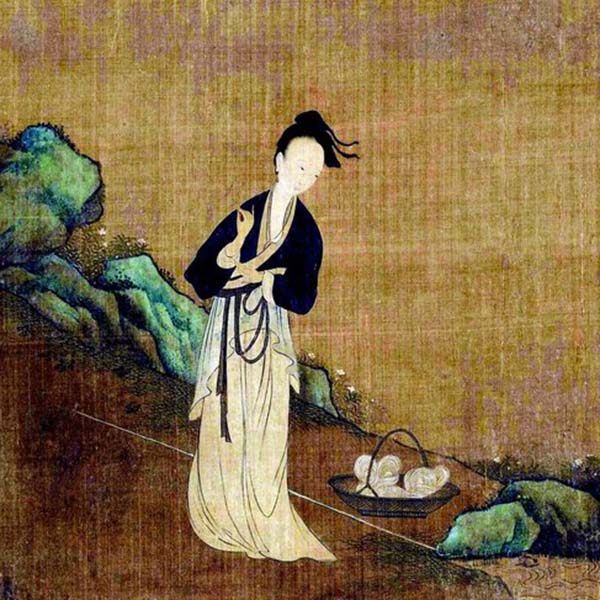Li Bai, 夏歌
Ballads of Four Seasons: Summer, 子夜四時歌
For three hundred miles along the banks of Mirror Lake
Lovely lotus lilies blossoms flower.
In fifth moon, a smiling Xi Shi gathers them,
As lowly peasants look on from the bank at Yuoye Stream.
Her boat turns back without waiting for the moon to rise
To the Royal House of Yue to warmhearted sighs.
鏡湖三百里
菡萏發荷花
五月西施采
人看隘若耶
回舟不待月
歸去越王家
Jìng hú sānbǎi lǐ
hàn dàn fā héhuā
wǔ yuè xīshī cǎi
rén kàn ài ruò yé
huí zhōu bùdài yuè
guī qù yuè wángjiā
The Summer Period
This is the third of Li Bai’s four seasonal ballads.
Historically, we are at the tail end of the Spring and Autumn Period (771 to 453 B.C.), immediately preceding the Warring States Period. Li Bai sets the poem in the fifth lunar month (which we designate as May) and the start of summer.
The poem picks up with the conclusion of the war between the Houses of Yue and Wu, omitting the fall and rise of King Goujian (勾踐, 496–465 BC). Instead, the poem tells of the aftermath and the fate of the lovely Xi Shi.

Xi Shi
The well known story goes like this. The State of Yue, where Xi Shi and her family lived, was defeated in a war with its neighbor State of Wu and Goujian (520-465 BC), the king of the Yue was captured. Made prisoner, Goujian was made a servant of the king of Wu. Three years later, he was set free. Remembering the many humiliations he suffered, Goujian plotted his revenge. All the meanwhile, living simply as a peasant, eating their foods, and tasting the bile of an animal each day as memory of his suffering at the hands of the king of Wu.
The fair Xi Shi was one of the renowned Four Beauties of ancient China. She was recruited by Goujian and his minister Fan Li to go to King Fuchai of Wu and distract him from his duties of state. Bewitched by her beauty, King Fuchai killed his best advisor and then began a series of disastrous political moves that eventually resulted in the killing of the king’s son and the destruction of the kingdom. King Fuchai himself, committed suicide when King Goujian surrounded his capital and demanded his surrender.
Li Bai’s ballad picks up after the defeat of Wu.
The victorious King Goujian kills all the scholars of Wu. King Goujian’s advisor Fan Li, seeing Goujian’s paranoia and taste for revenge, retires. In the legend recounted by Li Bai, Fan Li and Xi Shi live on a fishing boat, roaming like phantoms on the misty mirror-like waters of Lake Taihu, rarely seen.
Li Bai’s choice of the lotus blossom for Xi Shi is intentional. Because the flower rises from the mud and blooms in exquisite beauty, it symbolizes perfection and purity of heart and mind. It also represents long life and honor.











